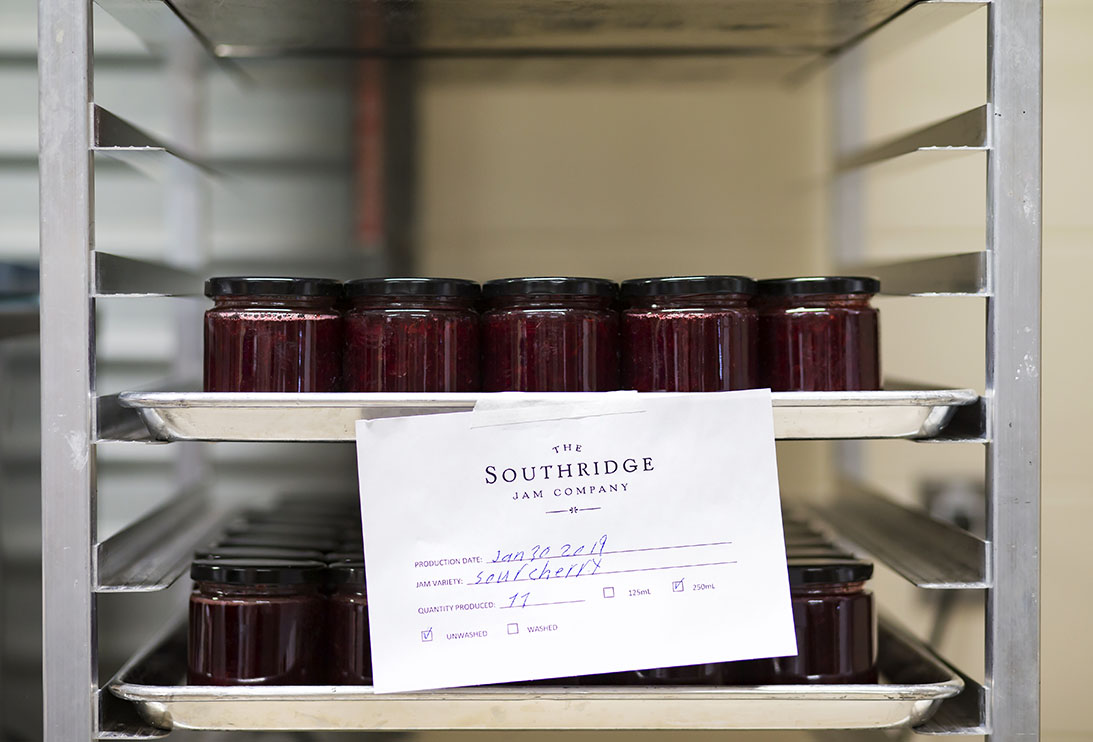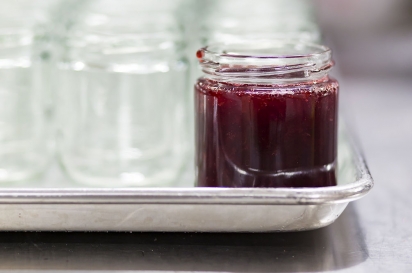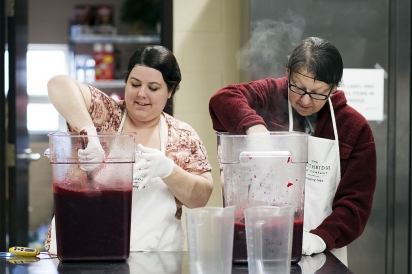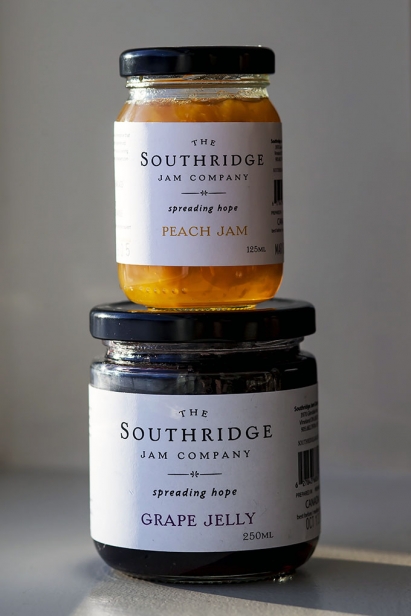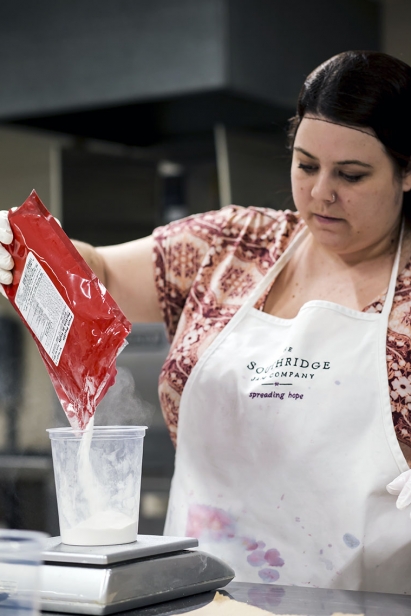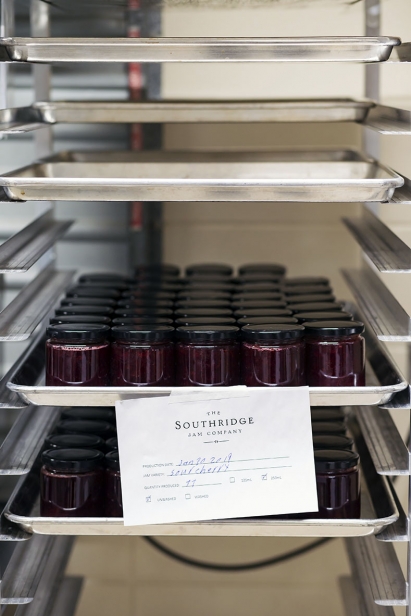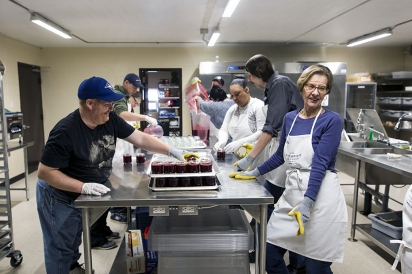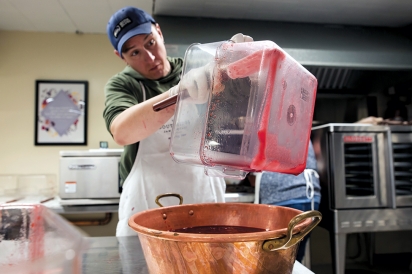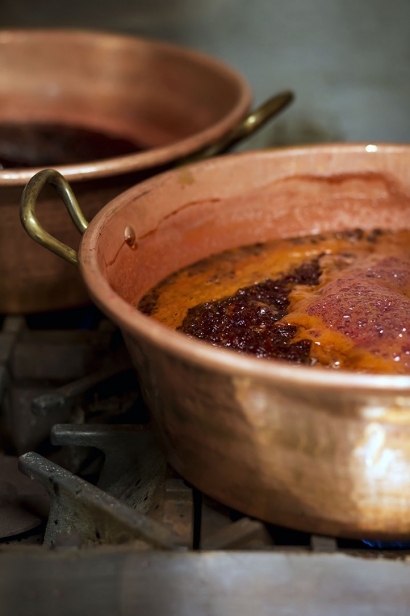Feel-Good Jam
Wednesdays are booked solid for 62-year-old Rosanne. Thursdays are filled for the Niagara woman, too.
On hump day, Rosanne, who asked that her last name not be used in this story, is committed to working her magic with strawberries, peaches and grapes in the Vineland kitchen of the Southridge Jam Company, turning the flagship fruits of summer into jams and jellies for the small-batch preserve operation. Thursdays, there’s inventory to take and orders for her handiwork to be processed.
Rosanne wouldn’t have her schedule any other way. Those standing dates with Southridge are about more than producing the next batch of toast’s soul mate. They’re a chance for her to return the favour to the place that ultimately returned stability to her life.
It was late December in 2011 when Rosanne found herself needing a place to live. She was struggling with alcohol addiction, but didn’t grasp just how serious an issue it was until she found herself homeless and at the threshold of Southridge Shelter in St. Catharines.
“I didn’t realize how much I was addicted,” Rosanne recalls. “I didn’t think I would get kicked out. I was behind on my bills, my rent. I didn’t see my drinking as a problem. I thought it was a normal part of life.”
She stayed at Southridge for a couple of months before striking out on her own again. She found herself needing to return a short while later and stayed until the end of summer 2012, when she felt normalcy returning to her life.
Rosanne never really left Southridge, though, even when she got another home of her own and maintained sobriety. She continues coming to the shelter’s namesake community church for Sunday service and stays in touch with staff, including Brendon Nicholson, Southridge Jam Co. program director, who tapped Rosanne to volunteer at the social enterprise when it launched in 2016.
Finding a home
The goal was to make and sell jam to support Southridge’s homelessness programs, including the shelter. Its other mandate was to teach job skills to people keen to re-enter the work world after their shelter stays. Participants could earn a letter of reference and a vote of confidence to complement their resumes. But mostly, the experience would foster friendships that would ease shelter users’ integration back into the community — one of the greatest hurdles faced by those transitioning from the isolation of homelessness to having a home. A lack of support and community connections during that changeover is one of the most common reasons a person can find herself at a shelter again, Nicholson notes.
“[It’s important to have] regular things on the calendar, whether it’s a coffee date or packing orders or making jam,” he says. “You go from living in an intense community for a period of time to getting your own place. Staying connected is so important.”
The Southridge Jam Company has been succeeding at its mandate of “spreading hope” since the first jar of strawberry jam came out of its kitchen nearly three years ago. What started as a 3,000-jar operation made with donated and wholesale local fruit has swelled to an annual production of 7,500 jars and a lineup of three flavours that grew to include sour cherry in 2018.
This year Southridge will start using frozen fruit from Cherry Lane in Vineland to meet demand until berry, cherry, peach and grape seasons arrive.
But Southridge jam is more than a breakfast condiment of choice for socially conscious preserve fans. It’s become a coveted wedding favour and a regular feature at 10 local retailers, complementing the jam company’s online sales. Local cafés, including De La Terre, Mirepoix and the Third Space, offer it with sides of toast. And when the bakers at Beechwood Doughnuts, a St. Catharines shrine of vegan deliciousness, re-introduced their PB & J doughnuts last fall, they drizzled them with Southridge’s grape jelly.
Thanks to the fortunate rookie error of not diluting grape juice with water in the jam company’s first season, that grape jelly has developed a cult following for its intense fruit flavour.
Those achievements are made sweeter by Nicholson’s stories of former shelter-users-turned-jam-makers who went on to land regular jobs elsewhere thanks to the confidence they earned from cooking down fruit and sugar in a supportive atmosphere. They have homes, cars, incomes, security and a critical safety net of community connections.
In total, 19 former shelter users are jam company alumni and many stay in touch with the organization.
“Once we’re out [of the shelter] and have our own place, it’s knowing they still have open doors for you,” says Jessica B., a recent shelter resident and current jam company participant.
“If I’m having a bad day, it’s knowing I can come back have someone to talk to.”
And then there are volunteers, such as Rosanne, who’ve been involved since the beginning and have something to do everyweek while showing their unyielding gratitude for what Southridge has done for them.
“This is a right-away opportunity for people to give back as well,” Nicholson says.
“It helps get your confidence back, too,” Rosanne adds. “After being homeless, you don’t have that and you just want to know everything’s going to be OK.”
Making lifelong relationships
On a quiet Thursday last November when strawberry fields had long been tilled, peach orchards dozed off into their winter slumber and vineyards laid dormant, Rosanne packed holiday orders alongside Tiffany Trudel, 27, and Jessica B., 23, who also asked that her last name not be used.
Both women lived at Southridge last summer — Trudel after difficulties with roommates left her unable to afford living on her own and Jessica after her alcoholism caused turmoil in her young family. Trudel and Jessica bonded during their two-month residency, the typical stay for most shelter residents who are often waiting for affordable housing in Niagara. They became roommates afterward.
Neither hesitated to join Southridge’s weekly “jam sessions” when the opportunity arose. Jam-makers start each production day by touching base on upcoming sales and partnerships.
“Then it’s like, OK, aprons on, they’re ready to go,” Nicholson says. “Everyone assumes their positions and gets to doing what they need.”
Participants take turns doing different jobs in the kitchen. Rosanne uses her eagle eye to ensure ingredients are precisely measured. Others mash fruit, stir bubbling pots, wipe dribblesoff freshly filled jars or wash dishes. They share their stories as they work, offer updates on their lives and crack jokes. "It’s realistic commercial kitchen work without being too stressful," Nicholson says.
Trudel, a former restaurant kitchen manager, was used to the grind of a commercial galley when she started at the jam company last summer. But she wasn’t used to talking to potential customers about the preserves. In time, the pride of selling something she helped make and hearing people’s overwhelmingly positive response to the Southridge Jam Co. story, eased her social anxiety, she says. With the 2019 preserving season about to start, the jam company also provides her some comfort for the future.
“Not everyone gets out of the shelter and flourishes,” Trudel says. “I struggle quite a bit. I don’t know if I’ll be homeless again, but hopefully, if all goes well, I’ll be back [to work with the jam company].”
Jessica, a former bakery worker, is reconciling with her family, using the jam she’s made as a catalyst for healing conversations. Her work with Southridge Jam Co. has also inspired her dream of a bakery of her own while laying a solid foundation for those aspirations.
Rosanne, meanwhile, is simply grateful for a calendar of jampacked Wednesdays and Thursdays.
“There’s so much give back, too,” she says, noting a recent dinner that Southridge hosted to thank jam company helpers. “It’s nice — we’re all appreciated. It’s give and take. It’s so rewarding.”
Southridge Jam Company
3970 Glendale Ave., Vineland, Ont.
southridgejam.com | 905.682.7978 ext. 130 | @ southridgejamco


